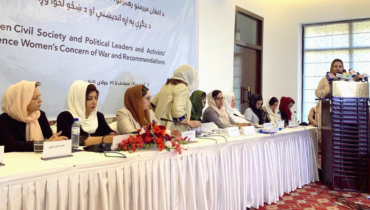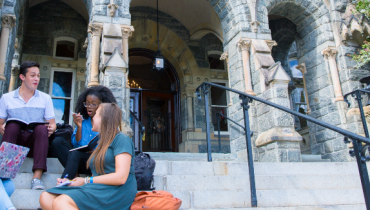We reached out to Reema Nanavaty of the Self Employed Women’s Association (SEWA), a close friend of the Georgetown Institute for Women, Peace and Security, to ask her how the women of SEWA are weathering the COVID-19 catastrophe that has taken a terrible toll on India in recent weeks. This is her report.
The current surge of COVID-19 across India is taking a toll on rural villages that were mostly spared from the initial pandemic outbreak in 2020. Across 16 Indian states, the Self Employed Women’s Association (SEWA) is mobilizing its members to respond to the crisis and act as leaders in their mostly poor and rural communities. Since 1972, SEWA has helped over 1.5 million Indian women workers in the informal sector attain work security, income security, food security, and social security, including health care and childcare. Now, the trade union has become a bridge between the formal government and health care authorities and informal, community-level teams working to prevent the spread of COVID-19 and dispel misinformation about the virus.
At the same time, SEWA women are confronting extreme financial hardship as COVID-19 restrictions have shut down the trains they use to commute to factory jobs and barred the sale of food, tea, and snacks by roadside vendors. Moreover, around 8,000 women laborers in the salt farming industry lost the opportunity to sell 600-700 tons of harvested salt because it was swept away when Cyclone Tauktae struck Gujarat this May. Many self-employed women surveyed by SEWA report they are no longer able to afford basic necessities like food and medicine as a result of the dual pandemic and economic crises. We spoke with Reema Nanavaty, the current head of SEWA, about how individual members are operating on the front lines of the pandemic response and what the international community can do to help.
According to Reema, SEWA “Sisters” are confronting four key challenges in their efforts to combat the spread of COVID-19 in rural India:
- Encouraging sick people to get tested for COVID-19
- Educating the community on the importance of wearing masks and other public health measures
- Persuading their communities to trust the COVID-19 vaccines
- Providing emergency assistance to women whose livelihoods have been devastated by COVID-19 restrictions and the destruction of Cyclone Tauktae
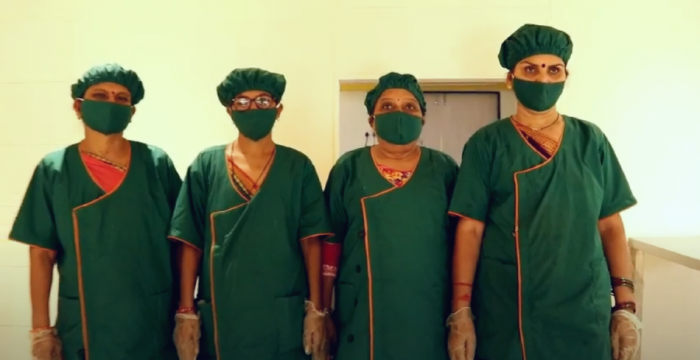
SEWA Network Filling Gaps in Availability of Medical Care
India’s medical system has arrived at the brink of collapse due to the massive uptick in COVID-19 cases in recent weeks. Shortages of ICU beds, oxygen, drugs, tests, and vaccines particularly impact rural communities that already lack strong healthcare infrastructure. India’s Central Bureau of Health Intelligence reports that in rural areas, there is only one allopathic doctor for every 10,000 people—ten times less than what the World Health Organization recommends.
Even when medical treatment is accessible, SEWA members reveal that cost is a major barrier to care for COVID-19 patients. Jashiben Ratan Thakor, who resides in Moti Pipli village in Radhanpur, had to borrow Rs 1.5 lakh (roughly $2,070 USD) for the treatment of her husband Ratan after he contracted the virus. “We took him to the hospital in town, but despite spending so much money, we could not save him,” says Jashi. She and her children were forced to move into her parent’s house because she cannot afford to care for her family on her current income.
To supplement health care for those who cannot access or afford it, SEWA has already converted 11 of its buildings into COVID-19 isolation centers. One member named Rasuben explains, “The Sanskar Kendra in Koliwada is ready with beds for isolating COVID patients. Houses in villages are cramped, and many times have only one or two rooms. In such cases, fever patients can be isolated at the center. Food and other facilities can be arranged.”
SEWA coordinators have been updated about COVID-19 vaccination drives and directed to become a bridge between the government and communities and mobilize villages for mass vaccination.
“We are constantly creating awareness about the benefits of vaccination and are readying the rural folks to get the shot. It is a tough exercise, but we are committed.”
Confronting Misinformation and Fear
Across the board, the women of SEWA report that widespread mistrust of COVID-19 testing and vaccine hesitancy are obstacles to overcoming the pandemic. “People go into hiding in the farms or run away on seeing a government health department vehicle,” says Alkaben, a SEWA leader in Anand district. “They feel the injection will give them disease and even death. We are constantly creating awareness about the benefits of vaccination and are readying the rural folks to get the shot. It is a tough exercise, but we are committed.”
Another SEWA member named Bhanuben summarizes the challenge of educating others on the urgency of the crisis: “I believe that the people of our villages have still not understood the severity of the situation. I say this because I don’t observe people wearing masks. They go to the market as per usual and don’t bother about social distancing. They think that the COVID-19 is a step of the government. No one believes in getting vaccinated either. People refuse to give us their Aadhar card for registration because they believe that vaccination is a ploy of the government. It takes us a lot of convincing to bring people onboard for vaccination.”
In the face of this misinformation and mistrust, SEWA members have become critical sources of reliable scientific information for their communities. Sakhiben, a SEWA member from Dhokawada, says sick people in her village were initially too afraid to get tested for COVID-19 despite having symptoms. But, Sakhiben explains, she and her colleagues have succeeded in changing attitudes about medical interventions: “We assured villagers that there was nothing to worry about, and if left unchecked everyone would fall sick. Teachers and students in the village were able to convince the unwell to get themselves treatment and also to isolate. We ran a testing drive in the village with the help of school children which brought more cases to light.”
Providing Emergency Assistance Amid Economic Shutdowns and Natural Disaster
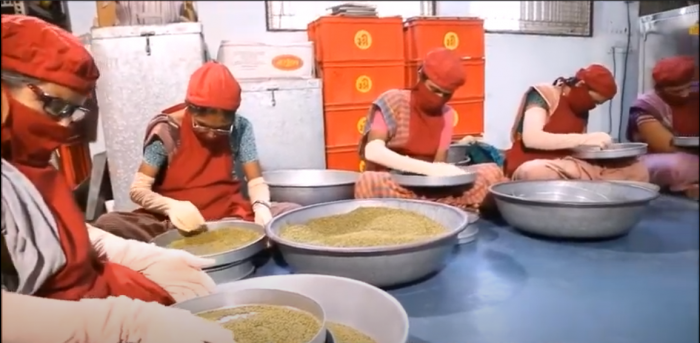
Cyclone Tauktae, the strongest storm on record to hit India’s west coast, swept through the state of Gujarat on May 17, 2021. The Times of India reported that at least 122 people were killed in the storm, and The Indian Express found that two weeks after the disaster, 10,447 villages in the state were left without power. The cyclone also hampered pandemic relief efforts, cutting power at 100 hospitals for COVID-19 patients in Gujarat and suspending vaccination campaigns.
“Cyclone Tauktae has washed away months of their hard work. Women are shocked, reeling under losses.”
SEWA laborers in salt production say Cyclone Tauktae left them with debts on their hands and no income in their pockets. “How will we survive? From where we will get money to put food on our family’s plates? My family had borrowed Rs 60,000 [around $823 USD] for the marriage of my son and daughter in hope of paying it off from salt income. Now, the salt is gone, there is no money to eat, and we have a massive debt on hand,” laments Manjuben Modhji, who is involved with salt farming in Surendranagar district.
Heenaben, a SEWA coordinator working with salt farmers in Halvad, confirms that SEWA sisters in her area lost all expected profits from their labor. “Salt producing women were hoping for better income this year, as instead of the traditional price of Rs 150-200 per man or maund, the promised price was Rs 325. However, Cyclone Tauktae has washed away months of their hard work. Women are shocked, reeling under losses,” she says.
In addition, Purnimaben of the tribal district Chota Udepur attests that SEWA sisters who farm other crops have suffered similar losses. “Standing crops of maize, sesame and green moong have been destroyed. Cyclonic winds blew away roofs from the homes of sisters. This has compounded the financial woes, as men who used to work in factories in Saurashtra have come back home due to the pandemic. Local businesses like catering business and roadside food and tea-snack stalls are also shut due to COVID.”
Heenaben explains that SEWA leaders are working with local governments to help assess and document these financial losses, but in the meantime, women salt farmers who have lost their incomes as well as their homes to the cyclone need immediate financial assistance. Reema Nanavaty adds, “It’s our responsibility to ensure aid to the sisters in such difficult times lest they get caught in the trap of money-lenders who charge exorbitant interest rates ranging from 5-10 percent per month.”
How to Support SEWA’s Response and Recovery Efforts
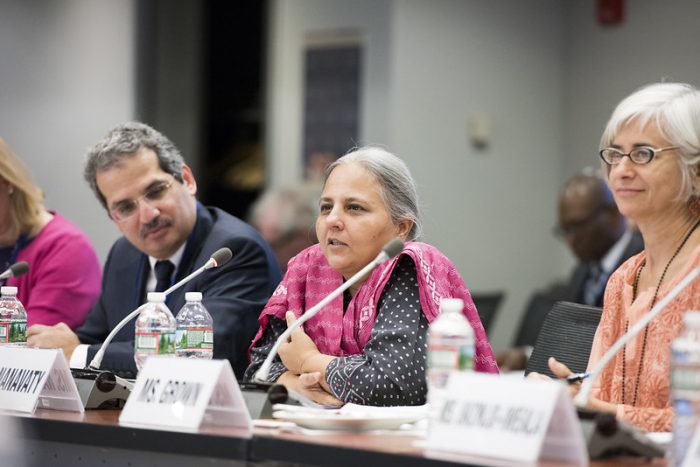
SEWA is working on a massive education and outreach campaign to help combat the dual crises of the pandemic and the cyclone. In the coming weeks, SEWA will distribute over 1.2 million masks in the urban areas and 1.5 million masks in the rural areas across Gujarat, Rajasthan, Uttar Pradesh, and Bihar. Members will help provide health kits, food packets, medicine, and financial relief to workers who have lost all sources of income as a result of lockdowns or natural disaster. In addition, SEWA will convert more of its offices to COVID-19 patient care centers staffed and equipped with adequate beds, medicine, and medical supplies.
SEWA welcomes any form of assistance, including funding the campaign and/or the donation of masks, sanitizers, and face shields that can be disseminated in the poor communities. Information about the campaign’s scope, allocation of resources, and anticipated impact can be found in this SEWA report. Donate directly to SEWA here.
While Reema acknowledges the immense difficulty of managing through a pandemic, she believes in her members’ resilience. “Driving such a change which requires massive shifts in social attitudes and behaviors apart from being prepared to take on physical, mental and financial batterings is a great challenge. SEWA sisters have advocated to become agents of this change.”
This post was authored by Reema Nanavaty, head of the Self Employed Women’s Association in India, and Evelyn Garrity, Program and Communications Associate at the Georgetown Institute for Women, Peace and Security.
